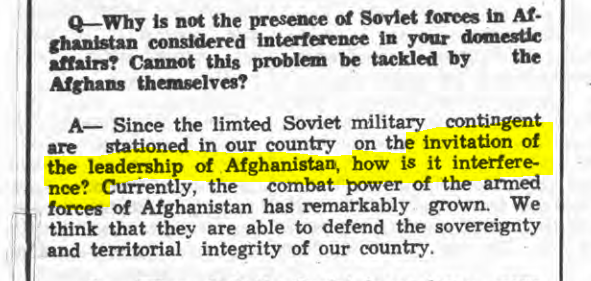
On the 2nd anniversary of the Saur Revolution in Kabul in 1980, Naheed, an Afghan girl, who was forced to attend the 'celebrations' like many others, started chanting anti-Soviet & anti-regime slogans. Other joined. Revolutionaries responded with bullets killing 70 incl. her.
https://twitter.com/Taimur_Laal/status/1387080379010535424
Exactly 100 years earlier in 1880, Malalay of Maiwand stood for Afghan honor and freedom. Naheed and many other young girls that day joined the ranks of Malalay and left a proud legacy for other women to follow. Many women did follow!
https://twitter.com/NafeesRehmanDr/status/1300870631538544640?s=20
Afghan women in Kabul came out in large numbers protesting the regime & the killing of women by the revolutionaries. They would threw their Duputta & Chador at the Afghan police shaming their Afghan honor. From Herat to Nuristan, to Kandahar, similar scenes of defiance were seen.
Many women were put in jail. In one incident, an Afghan police officer refused to hand over 6 Afghan girls to the Russians and shot the Russians as he knew what would happen to the girls and in turn to the Afghan honor.
With the increasing assaults on Afghan women and their honor some women equipped themselves with pistols. Some were taken into exile by their fathers to save their honor.
Some were killed by male family members. Yes,you read that right. Jauher, practiced by Rajput women to self-immolate to save their honor, has an additional but v. rarely practiced form in Afghan society where the male members kill the womenfolk before fighting the enemy to death.
Those women who couldn't resist publicly took less or non-violent actions making it difficult for the regime to function. Women in the employment of govt, would slow-down work. In education ministry, many books & pamphlets were lost & damaged. False attendance reports were made.
When Dr. Anahita was expelled & her ministry dissolved, Dilara Mahak was made president of the Khalq Organisation of Afghan Women. She was ex-principal of the Amana Fedowi school & was tasked to round women & girls for various regime functions and marches praising the revolution.
Some may interpret these young girls were happy liberated women dancing for and with the top army generals and politicians of the regime. But those who know Afghan society would tell you that such acts crossed all cultural & religious red lines.
The above accounts are taken from Nancy Dupree mostly based on her personal communications with the Afghan women refugees. Remember it was published in 1981 just three years into the Saur Revolution. What happened afterwards is even more horrific! 



Afghans can never thank Nancy & Prof. Louis Dupree enough for their services and what they have done for Afghanistan in documenting and preserving Afghans literary and cultural heritage devoting decades of their lives for the purpose.
Lastly, if these people wouldn't stop their propaganda, why should we stop presenting facts to counter them? They may some day realize that cheering the regime that killed millions and turned Afghanistan into an empire of graveyards isn't humanely.
https://twitter.com/NafeesRehmanDr/status/1261343464022855681?s=20
Plugging in an earlier thread on Kabul university that was established by Afghans, Turks and Indian Muslims to become a center of knowledge in the region but was destroyed by the communists.
https://twitter.com/NafeesRehmanDr/status/1324653160703660034?s=20
Another thread on the Herat uprising when civilian population rose against the red revolution. The communist regime responded by sending Jets and tanks. Various report suggest upwards of 20,000/ people were killed by the 'people-friendly' revolution.
https://twitter.com/NafeesRehmanDr/status/1239139642127065088?s=20
• • •
Missing some Tweet in this thread? You can try to
force a refresh











